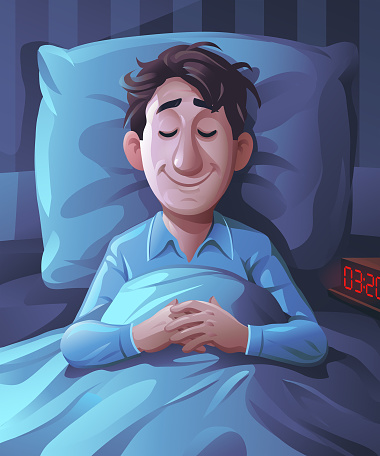signalmankenneth
Verified User
Getting a good night’s sleep can come down to a few numbers. Following the sleep rule can help you fall asleep faster and enjoy better quality sleep for a healthier body and mind.
The Importance of Sleep
Most adults need between 7 and 8 hours of quality sleep each night. When our bodies don’t get enough sleep, we’re at greater risk of chronic health problems including high blood pressure, diabetes, stroke, obesity, heart disease, and depression. Sleep deprivation means our mental abilities aren’t as good as they could be with shortened attention span, slow reaction times, poor memory, increasing errors, and reduced concentration.
However, sleep doesn’t come easily for many. Almost half of all Australian adults report two or more sleep-related problems. If you aren’t getting a good night's sleep, the following sleep rule may help you turn it around.
The Sleep Rule: 10-3-2-1-0
10 hours before bed: No more caffeine.
3 hours before bed: No more food or alcohol.
2 hours before bed: No more work.
1 hour before bed: No more screen time (shut off all phones, TVs and computers).
0: The number of times you hit snooze in the morning.
https://healthhub.hif.com.au/sleep-...rs before bed: No,phones, TVs and computers).

P.S.
DON’T…make big decisions after a lack of sleep
New research from the University of Ottawa, published in the journal Psychophysiology, found that all-nighters — in which you go 24 hours or more without sleep — can significantly impact your ability to make smart decisions, as the lack of sleep dampened neural responses to the outcomes of their choices. After a sleepless night, people were less likely to feel good about positive outcomes, and more likely to feel neutral about bad outcomes, per the study, which looked at the impact of one night of total sleep deprivation on 56 healthy adults.
Anyone who has tossed and turned throughout the night knows that a lack of sleep can affect your mood, but it can also exacerbate the symptoms of many mental conditions including depression, anxiety and bipolar disorder. There’s also plenty of reasons to prioritize sleep from a physical standpoint: Not getting enough shut eye increases the risk of diabetes, cardiovascular disease and cancer, according to the American Academy of Sleep Medicine.
The CDC recommends at least seven hours of sleep for adults 18 to 60 — which, of course, can be easier said than done. If you struggle with sleep, there are certain research-backed things that you can do to increase your chances of getting a solid night of rest, including creating a winddown routine, avoiding screens, sticking to a consistent sleep schedule and maintaining an optimal sleep temperature of between 68 and 72 degrees.
Excerpt: from Yahoo/Life
The Importance of Sleep
Most adults need between 7 and 8 hours of quality sleep each night. When our bodies don’t get enough sleep, we’re at greater risk of chronic health problems including high blood pressure, diabetes, stroke, obesity, heart disease, and depression. Sleep deprivation means our mental abilities aren’t as good as they could be with shortened attention span, slow reaction times, poor memory, increasing errors, and reduced concentration.
However, sleep doesn’t come easily for many. Almost half of all Australian adults report two or more sleep-related problems. If you aren’t getting a good night's sleep, the following sleep rule may help you turn it around.
The Sleep Rule: 10-3-2-1-0
10 hours before bed: No more caffeine.
3 hours before bed: No more food or alcohol.
2 hours before bed: No more work.
1 hour before bed: No more screen time (shut off all phones, TVs and computers).
0: The number of times you hit snooze in the morning.
https://healthhub.hif.com.au/sleep-...rs before bed: No,phones, TVs and computers).

P.S.
DON’T…make big decisions after a lack of sleep
New research from the University of Ottawa, published in the journal Psychophysiology, found that all-nighters — in which you go 24 hours or more without sleep — can significantly impact your ability to make smart decisions, as the lack of sleep dampened neural responses to the outcomes of their choices. After a sleepless night, people were less likely to feel good about positive outcomes, and more likely to feel neutral about bad outcomes, per the study, which looked at the impact of one night of total sleep deprivation on 56 healthy adults.
Anyone who has tossed and turned throughout the night knows that a lack of sleep can affect your mood, but it can also exacerbate the symptoms of many mental conditions including depression, anxiety and bipolar disorder. There’s also plenty of reasons to prioritize sleep from a physical standpoint: Not getting enough shut eye increases the risk of diabetes, cardiovascular disease and cancer, according to the American Academy of Sleep Medicine.
The CDC recommends at least seven hours of sleep for adults 18 to 60 — which, of course, can be easier said than done. If you struggle with sleep, there are certain research-backed things that you can do to increase your chances of getting a solid night of rest, including creating a winddown routine, avoiding screens, sticking to a consistent sleep schedule and maintaining an optimal sleep temperature of between 68 and 72 degrees.
Excerpt: from Yahoo/Life
